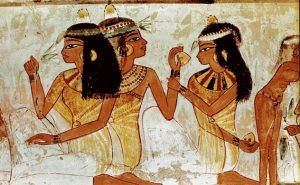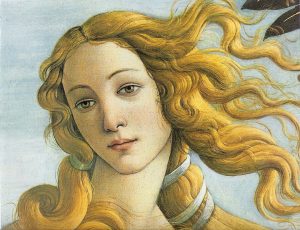
Posted on : June 8th, 2018
 For me, the smell of almond paste either in a freshly made croissant or some other wonderful almond dessert is such a heady experience I want to wear it like a perfume! I just love it, so one day I decided to look into the use of almond oil in perfumery. What I discovered was so interesting, I was amazed!
For me, the smell of almond paste either in a freshly made croissant or some other wonderful almond dessert is such a heady experience I want to wear it like a perfume! I just love it, so one day I decided to look into the use of almond oil in perfumery. What I discovered was so interesting, I was amazed!
The use of perfume goes back to the dawn of recorded history and, most likely, long before that. The first record of perfume-making came from the 2nd millennium BC in Mesopotamia. A woman named Tapputi is mentioned in a cuneiform tablet from that time as making perfume by distilling flowers, oil and sweet flag (a type of flowering wetlands plant) with other aromatic ingredients using methods shockingly sophisticated for that day and age. She was one of the world’s first chemists and worked at the royal palace in Mesopotamia. The full text describing her method for making perfume is a fascinating read and is not that dissimilar to how some people make handmade perfume from natural ingredients to this day.
Perfume was used extensively in ancient Egypt, India, Palestine, Greece and Rome. People used it to scent body oils and lotions to cover odors and protect themselves from the drying effects of the sun. They were also used as medicine and as an integral part of honoring the gods and goddesses. Images of people making and using perfume can be found in Egyptian hieroglyphs, Persian bas reliefs, and murals in the ancient Roman city of Pompeii.

Aphrodite
Because perfume was so important to the worship of the gods, perfumeries were often located near the temples. In 2003 the oldest perfumery found to date was unearthed by archeologist Maria Rosaria Belgiorno in Pyrgos on the island of Cyprus, birthplace of Aphrodite, the Greek goddess of love, sex, and beauty. The building had been destroyed in an earthquake in 1850 B.C., but perfume bottles, mixing jugs, and stills were found preserved under the collapsed walls along with finished perfume, some of the ingredients for making it, and even a few recipes. Along with anise, pine, coriander, bergamot, and parsley, almond was one of the key ingredients. Sweet almond oil, made from the same type of almonds we eat, was often used as a base and bitter almond (not safe to eat) was used to provide the sweet marzipan almond paste scent that I so like. The perfumes were used to honor Aphrodite and for their aphrodisiac effects. In fact, almond oil is still used as an aphrodisiac to this day! (It’s said to drive women mad with desire.)
An experimental archaeology center in Blera, Italy, decided to try to recreate these perfumes. They used instructions by the ancient Roman historian Pliny the Elder, who wrote extensively about the process in his books. Ironically, he was not a fan. He complained famously in particular about almond perfume which was extremely popular, saying that the scent disappeared so rapidly it seemed a disgrace that so many people wasted money on it!
And it is true — by itself almond essential oil does evaporate extremely quickly. It needs to be mixed with a fixative, essential oils that are so thick and heavy that they hold their own and other scents in a perfume mixture. Frankincense and Myrhh were used extensively in ancient times. Today people also use Vanilla, Sandalwood or both for the same effect.
Maisie Jane’s California Sunshine Products, Inc. was founded on strong beliefs and passion for offering unique, flavorful, top-quality, nut products. We strongly believe in earth-friendly practices that start on our family owned and operated orchards. We use Organic farming practices and continue in the process by using all-natural ingredients with no preservatives or GMOs. We believe in honest, friendly and helpful customer relations at all levels. We take pride in every task, every day, with every person.